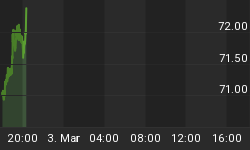Below is an extract from a commentary originally posted at www.speculative-investor.com on 9th March 2006.
Over the past two years the US$ inflation rate has been less than the inflation rates of the euro, the Pound, the Australian Dollar and the Canadian Dollar. This inflation rate advantage, combined with the dollar's interest rate advantage over most of its major competitors in the fiat currency world, has been the driving force behind a bull market in the Dollar Index that is presently 14 months old and is likely to last for at least another 6 months. We continue to believe, however, that this bull market is a counter-trend move within the context of a longer-term downward trend (a cyclical bull within a secular bear). Our reasoning is outlined below.
Although the US$ has experienced relatively less inflation over the past two years, between 1998 and 2003 there was a lot more inflation (money-supply growth) in the US than there was, for example, in the major economies of Europe. This made the dollar over-valued and thus set the stage for the long-term dollar bear market that began in 2001. Also, the US stock market was the focal point of the global boom in technology, telecom and internet stocks, so when the NASDAQ bubble burst in March of 2000 the US lost something that had been acting as a magnet for foreign investment; that is, it lost something that had been boosting the demand for the dollar.
It's important to note, though, that it wasn't until some time after the Fed had cut US interest rates aggressively in response to the 2001 recession, the 9/11 terrorist attacks and the plunge in capital spending that followed the bursting of the NASDAQ bubble that US$ supply began to overwhelm US$ demand and the Dollar Index began to trend lower in earnest. In other words, things happened during 2000-2001 that forced the Fed to adopt an ultra-easy monetary policy and it was this change in monetary policy (and the resultant inflation) that caused the dollar to weaken.
Our view is that events will once again conspire to eliminate the inflation-rate and interest-rate advantages that are the basis of the dollar's current upward trend. In particular, the huge costs of maintaining a military presence in the Middle East and re-building New Orleans, combined with the lack of any real desire to cut spending in other areas or raise taxes, all but guarantee a continuation of the current rapid pace at which the US Federal Government borrows dollars into existence. Furthermore, the Fed will again adopt an aggressive pro-inflation stance once the stock and commodity markets begin to trend lower with conviction and the economic data starts pointing towards a recession. As was the case during 2001-2004, large-scale deficit-spending by the US Government in combination with rate cuts by the Fed should catalyse another multi-year decline in the US$.
So, we expect that the main drivers of relative currency valuations -- inflation rates and interest rates -- will begin to pressure the dollar lower at some point during the second half of this year. It is very unlikely, however, that the US$ will ever COLLAPSE in value relative to any other fiat currency. The reason is that ALL of these currencies are in the process of being inflated into oblivion; it's just that over the next few years the dollar is likely to move towards that ultimate destination at a modestly faster pace than some of the other major currencies.
The dollar's orderly long-term decline against the Swiss Franc is illustrated by the following chart. Notice that the dollar has made a succession of lower highs and lower lows since 1970 and that there has never been a runaway bull or bear market. Rather, steady declines lasting 8-10 years have been punctuated by steady advances lasting 6 years. If this pattern continues then the next bottom will occur near the end of this decade with US$ and the Swiss Franc at close to parity.
If the dollar's decline ever did become disorderly, that is, if the dollar ever did begin to fall at an accelerated pace, then the central banks of the US's main trading partners could be relied upon to stem the decline by taking steps to weaken their own currencies. One thing you should never bet against is the ability of a central bank to devalue its currency. This is because someone with the power to create an unlimited supply of some 'thing' definitely has the power to lower the thing's value if they choose to do so.
















